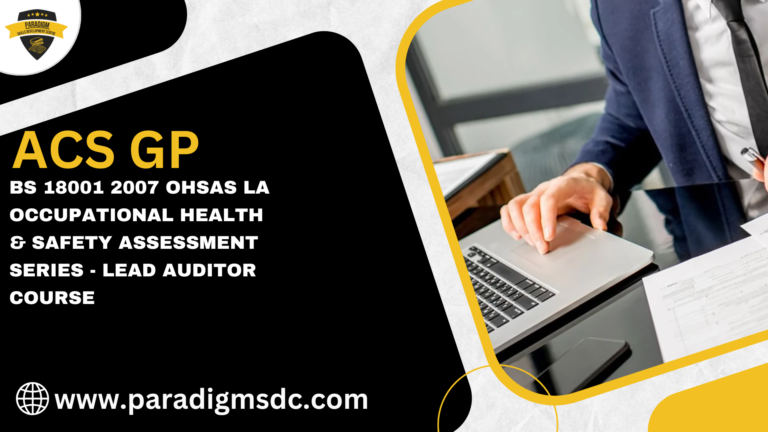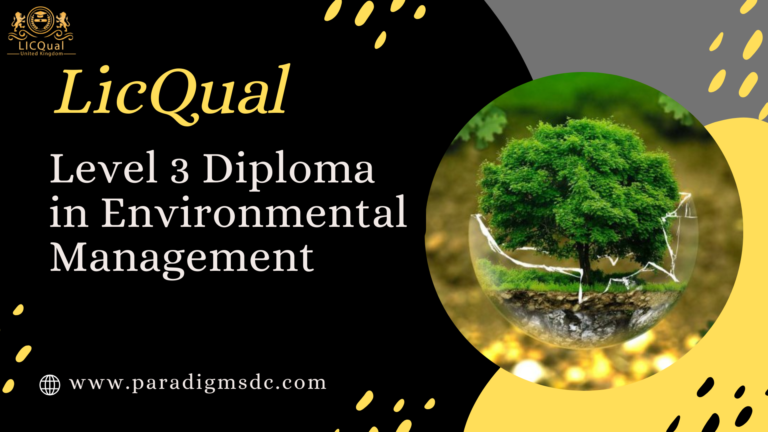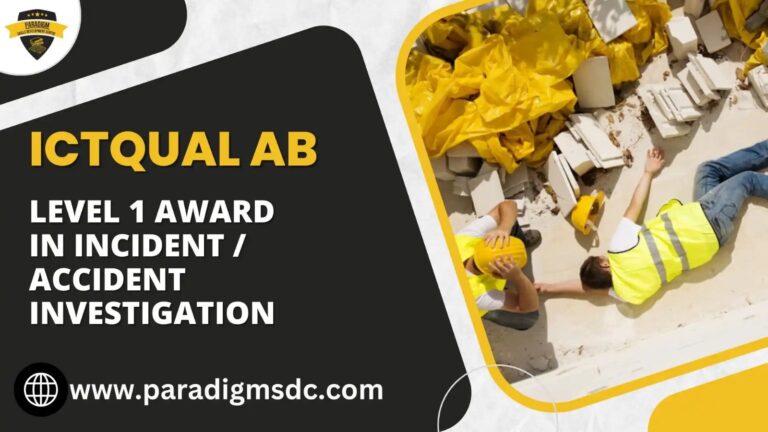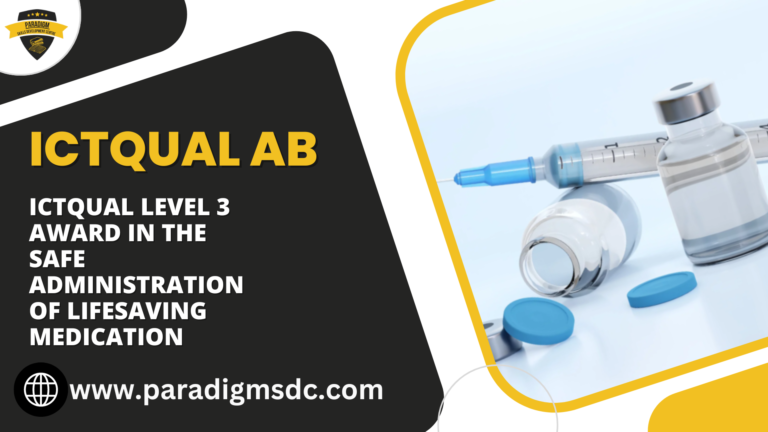Course Introduction
The ICTQual Level 8 Professional Diploma in Disaster Management is a prestigious qualification designed for professionals seeking to master the intricacies of disaster preparedness, response, recovery, and mitigation. This diploma equips individuals with the knowledge and skills necessary to effectively manage and coordinate disaster management efforts, ensuring communities are resilient and well-prepared for any eventuality.
Course Overview
This comprehensive program delves into the multifaceted aspects of disaster management, combining theoretical knowledge with practical application. It covers a broad spectrum of topics, from risk assessment and emergency planning to crisis communication and recovery strategies. The course is designed to meet the needs of professionals in both public and private sectors, including government agencies, non-governmental organizations, and international bodies.
Course Study Units
The ICTQual Level 8 Professional Diploma in Disaster Management includes the following study units:
Study Unit 1: Advanced Disaster Risk Assessment and Management
- Comprehensive Risk Analysis:
- Conduct advanced risk assessments to identify and prioritize potential hazards, vulnerabilities, and exposure factors in diverse disaster scenarios.
- Risk Management Strategies:
- Develop sophisticated risk management strategies that integrate mitigation, preparedness, response, and recovery measures tailored to different types of disasters.
- Technological Tools and Models:
- Utilize advanced technological tools, Geographic Information Systems (GIS), and modeling techniques to enhance the accuracy and effectiveness of risk assessments.
- Scenario-based Planning:
- Design and implement scenario-based planning exercises to simulate various disaster scenarios and evaluate response capabilities, resource allocation, and decision-making processes.
- Interdisciplinary Approach:
- Adopt an interdisciplinary approach to disaster risk management, incorporating insights from fields such as environmental science, engineering, sociology, and economics.
Study Unit 2: Advanced Emergency Response and Coordination
- Crisis Management Frameworks:
- Analyze and apply advanced crisis management frameworks, protocols, and best practices to effectively coordinate emergency response efforts across multiple stakeholders.
- Command and Control Structures:
- Design and implement command and control structures that facilitate efficient communication, decision-making, and resource mobilization during emergencies.
- Interagency Collaboration:
- Foster collaboration and coordination among diverse agencies, organizations, and sectors involved in emergency response, including government agencies, non-profit organizations, and private sector entities.
- Critical Incident Management:
- Develop strategies for managing critical incidents and complex emergencies, including mass casualty events, terrorist attacks, and natural disasters of unprecedented magnitude.
- Public Information Management:
- Implement advanced public information management strategies to disseminate timely, accurate, and actionable information to affected populations, media outlets, and stakeholders.
Study Unit 3: Advanced Disaster Recovery and Resilience
- Post-Disaster Needs Assessment:
- Conduct comprehensive post-disaster needs assessments to identify immediate, short-term, and long-term recovery priorities and interventions.
- Community-Based Recovery Strategies:
- Engage with communities to develop inclusive and culturally sensitive recovery strategies that promote social cohesion, equity, and resilience-building.
- Infrastructure Rehabilitation and Reconstruction:
- Develop and oversee infrastructure rehabilitation and reconstruction projects, ensuring they are resilient, sustainable, and aligned with community needs and aspirations.
- Psychosocial Support and Mental Health Care:
- Provide advanced psychosocial support and mental health care services to disaster-affected populations, addressing trauma, grief, and psychological distress.
- Economic Recovery and Livelihood Restoration:
- Facilitate economic recovery and livelihood restoration efforts, including job creation, business support, and economic diversification initiatives aimed at rebuilding local economies.
Study Unit 4: Advanced Policy Development and Advocacy
- Policy Analysis and Evaluation:
- Conduct in-depth policy analysis and evaluation to assess the effectiveness, equity, and relevance of existing disaster management policies and frameworks.
- Policy Formulation and Implementation:
- Develop evidence-based policy recommendations and advocacy strategies to address gaps, challenges, and emerging issues in disaster management at local, national, and international levels.
- Legislative Frameworks and Legal Instruments:
- Analyze and critique legislative frameworks and legal instruments related to disaster management, emergency response, humanitarian assistance, and human rights protection.
- Stakeholder Engagement and Multi-level Governance:
- Facilitate stakeholder engagement processes and multi-level governance mechanisms to foster collaboration, transparency, and accountability in disaster policy development and implementation.
Research Project: Advanced Topics in Disaster Management
- Research Proposal Development:
- Develop a research proposal outlining the objectives, research questions, methodology, and expected outcomes of the research project.
- Literature Review and Conceptual Framework:
- Conduct a comprehensive literature review to identify relevant theories, concepts, and empirical studies related to the chosen topic and develop a conceptual framework for the research.
- Data Collection and Analysis:
- Collect and analyze primary or secondary data using advanced research methods and techniques, such as surveys, interviews, case studies, or statistical analysis.
- Findings and Recommendations:
- Present the findings of the research project, critically analyze the results, and draw meaningful conclusions and recommendations for policy and practice in disaster management.
- Presentation and Dissemination:
- Prepare a written report and deliver an oral presentation of the research findings to peers, faculty, and stakeholders, effectively communicating the research outcomes and implications for the field of disaster management.
Learning Outcomes
Upon completing this course, participants will:
Study Unit 1: Advanced Disaster Risk Assessment and Management
- Comprehensive Risk Analysis:
- Apply advanced techniques to conduct thorough risk assessments, identifying and prioritizing potential hazards, vulnerabilities, and exposure factors across diverse disaster scenarios.
- Risk Management Strategies:
- Develop sophisticated risk management strategies that encompass mitigation, preparedness, response, and recovery measures, tailored to address the specific characteristics of different types of disasters.
- Technological Tools and Models:
- Utilize advanced technological tools, including Geographic Information Systems (GIS) and modeling techniques, to enhance the accuracy and effectiveness of risk assessments, improving decision-making processes.
- Scenario-based Planning:
- Design and implement scenario-based planning exercises to simulate various disaster scenarios, evaluating response capabilities, resource allocation, and decision-making processes under different conditions.
- Interdisciplinary Approach:
- Adopt an interdisciplinary approach to disaster risk management, integrating insights from environmental science, engineering, sociology, and economics to develop holistic solutions to complex risk challenges.
Study Unit 2: Advanced Emergency Response and Coordination
- Crisis Management Frameworks:
- Analyze and apply advanced crisis management frameworks, protocols, and best practices to effectively coordinate emergency response efforts across multiple stakeholders, ensuring a coordinated and efficient response.
- Command and Control Structures:
- Design and implement command and control structures that facilitate efficient communication, decision-making, and resource mobilization during emergencies, ensuring effective leadership and coordination.
- Interagency Collaboration:
- Foster collaboration and coordination among diverse agencies, organizations, and sectors involved in emergency response, promoting interoperability and synergy in response efforts.
- Critical Incident Management:
- Develop strategies for managing critical incidents and complex emergencies, including mass casualty events, terrorist attacks, and natural disasters, ensuring a swift, coordinated, and effective response.
- Public Information Management:
- Implement advanced public information management strategies to disseminate timely, accurate, and actionable information to affected populations, media outlets, and stakeholders, fostering transparency and public trust.
Study Unit 3: Advanced Disaster Recovery and Resilience
- Post-Disaster Needs Assessment:
- Conduct comprehensive post-disaster needs assessments to identify immediate, short-term, and long-term recovery priorities and interventions, ensuring a targeted and effective recovery process.
- Community-Based Recovery Strategies:
- Engage with communities to develop inclusive and culturally sensitive recovery strategies that promote social cohesion, equity, and resilience-building, empowering communities to lead their own recovery efforts.
- Infrastructure Rehabilitation and Reconstruction:
- Develop and oversee infrastructure rehabilitation and reconstruction projects, ensuring they are resilient, sustainable, and aligned with community needs and aspirations, contributing to long-term recovery and development.
- Psychosocial Support and Mental Health Care:
- Provide advanced psychosocial support and mental health care services to disaster-affected populations, addressing trauma, grief, and psychological distress, promoting healing and resilience.
- Economic Recovery and Livelihood Restoration:
- Facilitate economic recovery and livelihood restoration efforts, including job creation, business support, and economic diversification initiatives aimed at rebuilding local economies, enhancing community resilience and sustainability.
Study Unit 4: Advanced Policy Development and Advocacy
- Policy Analysis and Evaluation:
- Conduct in-depth policy analysis and evaluation to assess the effectiveness, equity, and relevance of existing disaster management policies and frameworks, informing evidence-based policy recommendations.
- Policy Formulation and Implementation:
- Develop evidence-based policy recommendations and advocacy strategies to address gaps, challenges, and emerging issues in disaster management at local, national, and international levels, driving policy change and improvement.
- Legislative Frameworks and Legal Instruments:
- Analyze and critique legislative frameworks and legal instruments related to disaster management, emergency response, humanitarian assistance, and human rights protection, advocating for legal reforms and improvements.
- Stakeholder Engagement and Multi-level Governance:
- Facilitate stakeholder engagement processes and multi-level governance mechanisms to foster collaboration, transparency, and accountability in disaster policy development and implementation, ensuring inclusive and participatory decision-making processes.
Research Project: Advanced Topics in Disaster Management
- Research Proposal Development:
- Develop a clear and well-structured research proposal outlining the objectives, research questions, methodology, and expected outcomes of the research project, demonstrating proficiency in research design and planning.
- Literature Review and Conceptual Framework:
- Conduct a comprehensive literature review to identify relevant theories, concepts, and empirical studies related to the chosen topic, synthesizing existing knowledge and developing a robust conceptual framework for the research.
- Data Collection and Analysis:
- Collect and analyze primary or secondary data using advanced research methods and techniques, such as surveys, interviews, case studies, or statistical analysis, ensuring rigor and validity in data collection and analysis processes.
- Findings and Recommendations:
- Present the findings of the research project, critically analyzing the results and drawing meaningful conclusions and recommendations for policy and practice in disaster management, contributing to knowledge advancement and evidence-based decision-making.
- Presentation and Dissemination:
- Prepare a written report and deliver an oral presentation of the research findings to peers, faculty, and stakeholders, effectively communicating the research outcomes and implications for the field of disaster management, facilitating knowledge exchange and dissemination.
Course Benefits
The ICTQual Level 8 Professional Diploma in Disaster Management offers numerous benefits, including:
- Enhanced Career Opportunities: This qualification opens doors to senior positions in disaster management and related fields.
- Comprehensive Skillset: Participants gain a well-rounded understanding of all aspects of disaster management, making them versatile professionals.
- Professional Recognition: This diploma is recognized globally, enhancing your professional credibility and marketability.
- Networking Opportunities: Engage with a diverse cohort of professionals, building valuable connections in the disaster management community.
- Practical Experience: Apply learned concepts through simulations and case studies, ensuring you are well-prepared for real-world scenarios.
Who is this Course For?
The ICTQual Level 8 Professional Diploma in Disaster Management is ideal for:
- Disaster Management Professionals: Those already working in the field who wish to enhance their knowledge and skills.
- Government Officials: Personnel involved in emergency planning, response, and recovery at local, regional, or national levels.
- NGO Workers: Individuals working with non-governmental organizations focused on disaster relief and humanitarian aid.
- Corporate Managers: Professionals responsible for business continuity and crisis management within organizations.
- Academics and Researchers: Those studying or teaching disaster management, seeking advanced knowledge and insights.
- International Agency Personnel: Employees of international bodies such as the UN, WHO, or Red Cross involved in disaster management and response.
Future Progression
Upon completing the ICTQual Level 8 Professional Diploma in Disaster Management, graduates can pursue various advanced career paths and further educational opportunities, such as:
- Senior Management Roles: Positions such as Disaster Management Director, Emergency Response Coordinator, and Crisis Management Consultant.
- Advanced Academic Pursuits: Enrolling in doctoral programs or specialized research in disaster management and related fields.
- Consulting and Advisory Roles: Providing expert advice to governments, NGOs, and private organizations on disaster management strategies.
- International Opportunities: Working with global organizations in disaster-prone regions, contributing to international disaster management efforts.
- Continuous Professional Development: Engaging in additional certifications and training to stay updated with the latest developments in the field.
Embark on a transformative journey with the ICTQual Level 8 Professional Diploma in Disaster Management, and become a leader in safeguarding communities and building resilience against disasters.







